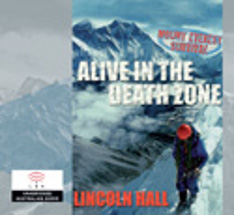Alive in the death zone by Lincoln Hall

Louis Braille Audio, Melbourne, 2009. (Random House Australia, 2008).
ISBN 978 1742123622. 3 CDs, 3 hours.
(Ages 12+) Non fiction. The introduction is breathtaking in
telling, succinctly what finding
his body on Mount Everest did for his rescuers, and the audience
captured, the story of how and why Lincoln Hall was on Mount Everest in
a position no other person has survived, came about. At high school in
Canberra a new physical education teacher, Norman Booth, taught rock
climbing skills, and took Lincoln and his friend Ralph to rocks in the
area, and places outside the Canberra region to climb. These included
the Warrumbungle Ranges, where the experience spurred him on toe climb
far afield. At university he joined the mountaineering club which
increased his skills and interest, and a group went to India to climb a
glacier in the Himalayas. This was the routine over the next number of
years, culminating in an attempt at climbing Mount Everest in 1987
which ended with him deciding never to attempt this again. Then he was
the photographer on a climb of a lesser mountain, but spying Everest in
the distance enticed him to try again, so in 2006, he found himself
back at Everest.
It is this story of what happened on Everest that is well known, but
listening to it on the CD is involving to a degree I hadn't expected.
David Tredinnick reads the story as if he was there. He draws the
listener in with his deliberately slow, deep tones. His reading is well
modulated and each word clearly enunciated so that all meaning behind
the words is revealed. His reading when telling us information, why
oxygen is lessened once you climb, or the importance of altitude, is
pointedly different from the voice used in telling the story, clearly
indicating that this information is important and has an impact on the
rest of the story.
Subtitled, Mount Everest Survival, this story is thrilling in
its
exposition, enticing in its information about a place very few of the
listeners have any knowledge or experience of and informative in the
range of facts given. We hear of the range of mountains in the world,
and their ranking and the first time each was climbed, the equipment
and how it is used, as well as the perils of climbing at such an
altitude. An amazing story, told with verve, will entrance all
listeners.
Fran Knight